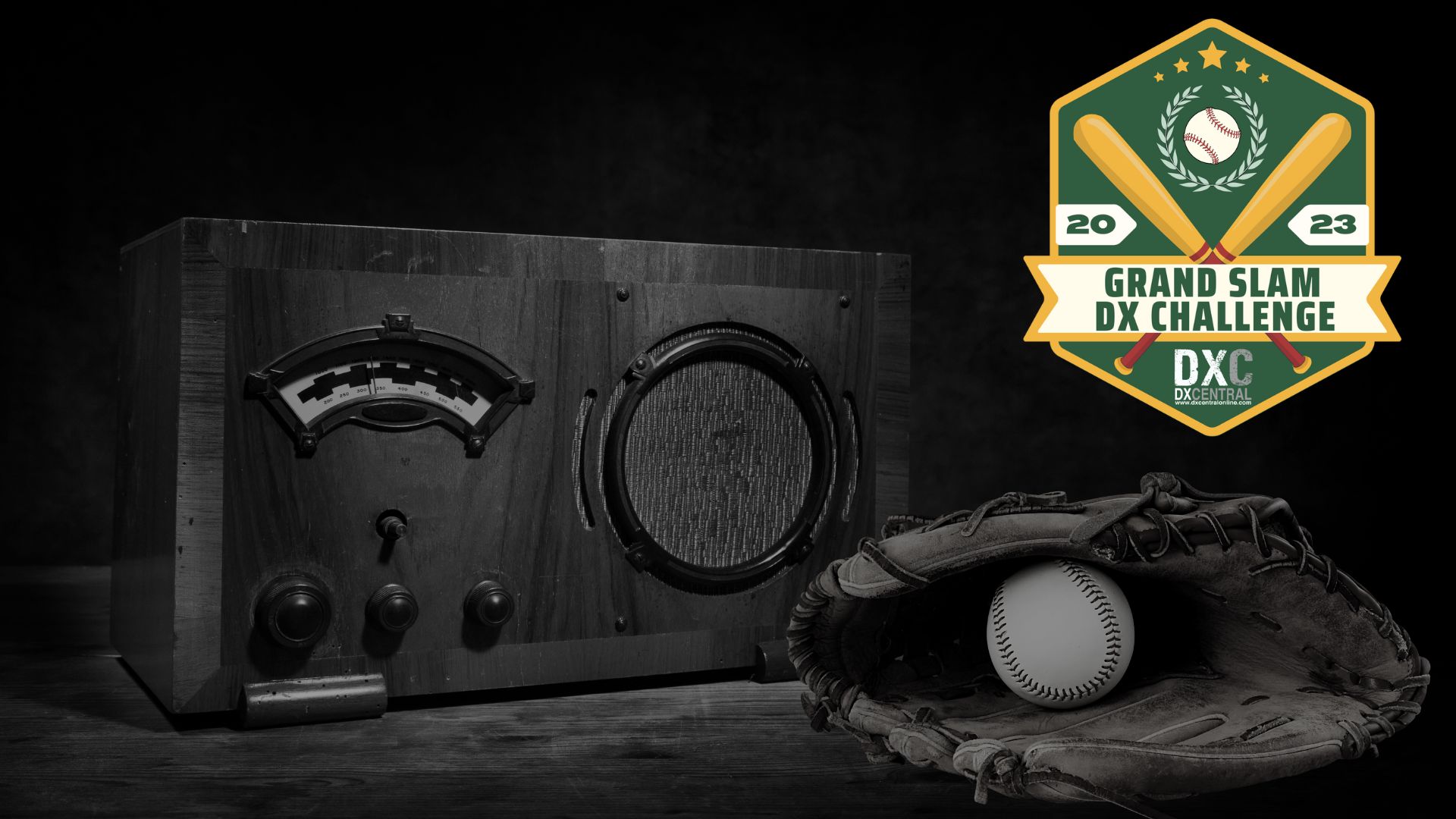
Many thanks to SWLing Post contributor, Carlos Latuff, who shares the following recording of some ultralight DX catches while he travels in Ireland:

Welcome to the SWLing Post’s Radio Waves, a collection of links to interesting stories making waves in the world of radio. Enjoy!
Many thanks to SWLing Post contributors David Iurescia, Christopher Brennen, Doug Katz, Dennis Dura, Jon Langley, and Mark Pascoe for the following tips:
A special CZK 200 silver coin has been issued by the Czech National Bank to mark the 100th anniversary of Czech Radio. The coin’s design features images related to the history of the radio’s first broadcasts.
It was way back in 1923, specifically on May 18 at 8:15pm in the evening, that Czechoslovak Radio began broadcasting from what was a Scouts’ tent in Prague’s Kbely district. Czechoslovakia thus became only the second country in Europe to establish regular broadcasting. At first these were only hour-long broadcasts, but soon they grew into longer and more varied segments that even included broadcasting in English and Esperanto as early as 1924.
The popularity, size and resources of the country’s radio grew rapidly from that point onwards and Czechoslovak Radio would go on to also play important roles in the country’s history by providing vital information to its citizens during the 1945 uprising against Nazi occupation forces and the 1968 Invasion of Czechoslovakia.
No wonder then that the centenary the country’s public broadcaster is being celebrated in great style. Czech Radio itself has prepared a variety of events and shows commemorating the anniversary this year – and especially this week. Meanwhile, the Czech Post has issued special stamps marking the occasion.
Now, the Czech National Bank has joined in, by issuing its own special CZK 200 silver coin. On one side, it features pictures of a radio microphone, transmission masts and of the historic broadcasting facility in Kbely. The other side of the coin shows the tent from which the first broadcast was made and the logo of Czechoslovak Radio. The design is the work of academic sculptor Marie Šeborová, who has already created several commemorative coins and medals in the past. Continue reading
 (Source: Axios via Dennis Dura)
(Source: Axios via Dennis Dura)
A bipartisan group of lawmakers wants to make it illegal for carmakers to eliminate AM radio from their cars, arguing public safety is at risk, Axios is first to report.
Why it matters: AM radio is one key way that government officials communicate with the public during natural disasters and other emergencies.
Context: Some manufacturers are eliminating AM radio from their electric vehicles (EVs) because of interference from the electric motors that results in annoying buzzing noises and faded signals. [Continue reading at Axios…]
Welcome to the SWLing Post’s Radio Waves, a collection of links to interesting stories making waves in the world of radio. Enjoy!
Many thanks to SWLing Post contributors Dave Porter, Mark Hirst, Stuart Smolkin, Bill Forcier, and “Mangosman” for the following tips:
talkSPORT Limited (“talkSPORT”) submitted a request to reduce the coverage of its national AM
(medium wave) commercial radio service from 93% to 89.9%, by ceasing transmissions from the
following four of its twenty-two transmitter sites:
We consulted on the request with a preliminary view that we were minded to approve it. We have had regard to the responses we have received in reaching our decision. We received two responses agreeing with the proposal and four disagreeing. In section 3 below, we summarise stakeholders’ comments, assess them and outline the conclusions we have reached.
What we have decided – in brief
Ofcom has decided to approve the request submitted by talkSPORT Limited to reduce its AM
(medium wave) coverage by ceasing transmissions from four of its transmitter sites.
Click here to read the full PDF brief.
In times of emergency AM Radio could be your only source of information.
AM Radio is part of the Emergency Alert System, so critical life saving information during hurricanes, floods, blackouts and other disasters are delivered to you via AM Radio.
Certain car manufacturers have dropped AM Radio from their current and future vehicles.
This profit motivated move by car manufacturers is dangerous!
Sign the petition to maintain broadcast AM Radio in current and future vehicles, including electric vehicles.
Click here for more information and to sign.
Note: The Washington Post article about AM being removed from cars is behind a paywall. The link provided may give you free access.
America’s love affair between the automobile and AM radio — a century-long romance that provided the soundtrack for lovers’ lanes, kept the lonely company with ballgames and chat shows, sparked family singalongs and defined road trips — is on the verge of collapse, a victim of galloping technological change and swiftly shifting consumer tastes.
The breakup is entirely one-sided, a move by major automakers to eliminate AM radios from new vehicles despite protests from station owners, listeners, first-responders and politicians from both major parties.
Automakers, such as BMW, Volkswagen, Mazda and Tesla, are removing AM radios from new electric vehicles because electric engines can interfere with the sound of AM stations. And Ford, one of the nation’s top-three auto sellers, is taking a bigger step, eliminating AM from all of its vehicles, electric or gas-operated.
Some station owners and advertisers contend that losing access to the car dashboard will indeed be a death blow to many of the nation’s 4,185 AM stations — the possible demise of a core element of the nation’s delivery system for news, political talk (especially on the right), coverage of weather emergencies and foreign language programming.
“This is a tone-deaf display of complete ignorance about what AM radio means to Americans,” said Michael Harrison, publisher of Talkers, a trade journal covering the talk radio industry. “It’s not the end of the world for radio, but it is the loss of an iconic piece of American culture.” [Possible paywall: Continue reading…]
Click here to view on YouTube.
TAMPA, Fla. — Special operations signals intelligence teams say they need smaller, more versatile gear that gathers and shares data on the breadth of radio frequencies in all domains — land, sea, air and now space.
The mission has shifted dramatically as the United States ratchets up competition in the frequency bands with peer competitors like Russia and China, a far cry from deciphering mobile phone signals from violent extremists, officials said.
That’s one request to industry within a small slice of a larger portfolio under U.S. Special Operations Command Program Executive Office-Special Reconnaissance.
On Wednesday, a panel of program managers ticked off the varied sensor, communications and intelligence gear the office wants during the Global SOF Foundation’s SOF Week here.
Their efforts to upgrade and improve collection and dissemination of data continues in an ever-more crowded radio frequency spectrum across, and beyond, the globe. [Continue reading…]
DRM Is Smart and on the Way Up (Radio World)
The author is chairman of the DRM Consortium. Her commentaries appear regularly at radioworld.com.
This was the conclusion and feeling of the in-person and Zoom participants in the Digital Radio Mondiale Consortium General Assembly, held on the sunny island of Mallorca Spain.
Who Uses DRM?
The sky was blue and the boats were swaying in the harbor, but the participants from countries as far apart as India, Brazil, Denmark, South Africa — and other African countries like Egypt, Indonesia, Hungary, Germany and the UK — had other fish to fry.
They wanted to know about DRM in India, where more pure DRM hours are being carried, including dedicated content like news and cricket. More MW transmitters will be inaugurated there, but the decision for the FM digitization is still pending. Last year, Ernst & Young consultants concluded in a study for the I@B Ministry that radio digitization is not only technically beneficial, but also financially. “Digital Radio can help grow the Radio Segment in India by three times over five years.” The local automotive industry, with almost six million new Indian cars equipped with DRM radios, is also very interested in the decision. The big Indian and international car brands, eying a return on their huge investments, are ready to quickly software upgrade the existing DRM AM receivers to digital DRM FM. [Continue reading…]
Please consider supporting us via Patreon or our Coffee Fund!
Your support makes articles like this one possible. Thank you!
 Many thanks to SWLing Post contributor, Ron, who notes that the Spitfire AM transmitter is on sale (GBP 71.95 or approx. $91 US) via the manufacturer’s eBay store for the next three days. Ron notes:
Many thanks to SWLing Post contributor, Ron, who notes that the Spitfire AM transmitter is on sale (GBP 71.95 or approx. $91 US) via the manufacturer’s eBay store for the next three days. Ron notes:
Tony has solved the hum problem that plagues AM part 15 transmitters.
This model comes ready to go, just hook it up. It meets all Part 15 requirements.
Enjoy listening to the 1940’s radio station (for example) on your own AM station.
Comes set up for 1600 kHz but Tony will tune it to whatever you
want or you can adjust the dip switch yourself.
Has a built in stereo to mono converter and full sound range audio.
Hurry, the Sale ends soon.
Click here to check out the Spitfire AM transmitter on eBay.
Welcome to the SWLing Post’s Radio Waves, a collection of links to interesting stories making waves in the world of radio. Enjoy!
Many thanks to SWLing Post contributors Dennis Dura, Dave Porter, and David Iurescia for the following tips:
State association questionnaire finds one in three AM stations have no FM translator
The National Alliance of State Broadcasters Association (NASBA) is reporting insights it discovered after polling AM stations about the removal of over-the-air AM in new cars.
The data collected from more than 1,000 AM stations shows that many do not have an FM translator and/or do not stream their signals over internet connections, NASBA says. The group is hoping to use the information to rally proponents of AM to help convince companies like Ford, Mazda, BMW and others to keep reception of AM in their new vehicles.
NASBA says the automakers “are cutting corners on expensive new electric vehicles” by eliminating AM radios, which means more than 4,000 AM stations in the United States are at risk. But its survey results show that AM radio across the country provides a diverse mix of music and talk and is a vital link for millions of listeners. [Continue reading…]
“It was the music without the spots, that made FM,” says a reader
The comments written by Dave Bialik in the latest Radio World hits the nail right on the head. The average person, which is about 95% of the population, couldn’t care less about audio fidelity. The days of “audiophiles” are gone. The downturn of AM listenership is almost exclusively due to poor programming, poor content. Yes, FM in its early days was mostly easy listening, beautiful music and classical music. It catered to the audiophiles, and had a very limited audience even though it sounded great and in 1963 by offering multiplex stereo.
Once a few of the FM guys realized people were fed up with the 45 minute commercial breaks on AM stations with popular music, the format was adopted on FM, but with none or few commercials (because no one wanted to advertise on FM). Once people found out they could get the rock and pop music on FM without all the talk, the band switch started taking place. It had nothing to do with audio — remember at this time people were buying 8-track tapes by the millions and they were technically several steps below AM radio. It was the music without the spots, that made FM. Once that happened, most of the large and middle market stations threw all of their eggs into the FM basket and put something on the AM just to hold the license.
I once worked for an AM station owned by one of the large groups. In its heyday, in the 50’s–70’s, it was THE top 40 station. In a market of 40 stations, it had a 60 share. Once the group owners bought a big FM signal, they blew the AM away and loaded it with satellite talk. After a few years, that 60 share was .5 — yes point 5. After a few years of this, and it becoming unsellable, one of the staff suggested to management that they should go back to a music format playing the hits of the 50’s and 60’s (this was in 2002). [Continue reading…]
The BBC is suing the owner of a huge telecoms mast that burnt down almost two years ago, leaving more than one million households without TV or radio services.
A blaze destroyed the Bilsdale transmitter on the North York Moors in August 2021, sparking chaos across the region.
More than one million homes in North Yorkshire, Teesside and County Durham were unable to access FM radio or Freeview, with many disconnected for months.
The BBC has now filed a lawsuit against Arqiva, the company which owns the mast, saying it has failed to fully restore services more than 18 months later.
The public service broadcaster has accused the infrastructure group of breach of contract and is seeking tens of millions of pounds in damages. [Continue reading…]
Czech Radio celebrates a significant anniversary this year. 18 May 2023 marks exactly 100 years since the start of regular radio broadcasting in the Czech Republic, then Czechoslovakia, when the private company Radiojournal began broadcasting from a humble scout tent in Prague’s Kbely.
For the occasion of its monumental jubilee, Czech Radio has prepared a rich programme for the public, new broadcasting highlights and a unique exhibition at the National Technical Museum. Celebrations throughout the year will illustrate the remarkable journey of the most trusted public service media in the Czech Republic.
“Czech Radio will celebrate the 100th anniversary of the start of regular broadcasting. It is an honour for me to be at the helm of this public institution at a time when we are recapitulating important past moments, revisiting our history and remembering outstanding radio personalities. But this extraordinary anniversary is also an opportunity for us to show that 100 years of radio broadcasting is only the beginning. We are ready to launch the next century of our existence with new programming projects and technological innovations. The entire project of our anniversary celebrations aims to support the position of Czech Radio on the media market and also to show that it is an important partner for other institutions. I believe that with an imaginative programme we will not only delight current listeners, but also attract new ones,” said René Zavoral, Director General.
The celebrations will officially commence on 10 March with a formal ball at the Municipal House in Prague, where the Czech Radio Symphony Orchestra, the Gustav Brom Radio Big Band and musical guests Ewa Farna, Mirai, Dara Rolins and No Name will perform.
On the day of its 100th birthday, Czech Radio will hold a grand concert in the Riegrovy Sady park for listeners and the general public. The concert will include performances by the band Chinaski, as well as musicians Aneta Langerová, Mirai Navrátil and Marek Ztracený, who will be the first performer broadcast on Czech Radio in its second century of existence. [Continue reading…]
Please consider supporting us via Patreon or our Coffee Fund!
Your support makes articles like this one possible. Thank you!
Many thanks to SWLing Post contributor, Loyd Van Horn, who shares the following announcement:
 DX Central Announces Inaugural Grand Slam DX Challenge
DX Central Announces Inaugural Grand Slam DX ChallengeChances are, if you ask a DXer how they began their love of DX, many will tell you it all began by searching through the static for the unmistakable sounds of baseball.
Radio and baseball have been intrinsically tied together since the early days of both. In fact, radio broadcasts of baseball games, long before the days of television, are what helped to turn it into “America’s National Pastime.”
It is with that history in mind that we are pleased to announce the inaugural Grand Slam DX Challenge.
Originating from an idea between DX Central’s Loyd Van Horn (W4LVH) and Sean Kutzko (KX9X), the Grand Slam DX Challenge (GSDXC) once again honors the link between radio and baseball by challenging hobbyists to log as many radio stations, from as many Major League Baseball teams, as possible during the MLB regular season.
“I knew I wanted to have some sort of challenge,” says Van Horn. “I just wasn’t sure exactly what or how that would work. Then Sean came to me with the idea of doing something around the baseball season and I thought ‘that’s genius!’”
The notion of tying America’s game with DXing came naturally to Kutzko.
“My love for baseball goes back probably on par with the same time that I got interested in AM DXing as a really, really small kid,” says Kutzko. “[The challenge] is a multi-month event focused around the two greatest things that I spend my time with which is radio and baseball.”
 To help turn this idea into reality, Kutzko brought his experience building the ARRL’s National Parks on the Air (NPOTA) program in 2016 for the amateur radio community. In addition, Kutzko and Van Horn teamed up with Mike Leary (K7MSO), an experienced web developer and radio hobbyist, who volunteered his time and skills to the project.
To help turn this idea into reality, Kutzko brought his experience building the ARRL’s National Parks on the Air (NPOTA) program in 2016 for the amateur radio community. In addition, Kutzko and Van Horn teamed up with Mike Leary (K7MSO), an experienced web developer and radio hobbyist, who volunteered his time and skills to the project.
The premise is simple: a participant should try to receive as many stations – and from as many different Major League Baseball teams – as possible. The broadcasts must be from the team-sanctioned radio network broadcast (national broadcasts from networks such as ESPN, Westwood One, etc. do not count).
There are nine entry categories that a participant can choose from, and include AM only, FM only or both AM and FM submissions.
Submissions for the challenge will be through the challenge Web site: grandslamdxchallenge.com. The full rules and scoring system for the challenge also available on the same site.
It is important to note that this inaugural edition of the challenge is a true beta version. Feedback from the community will be critical for resolving any defects or making any improvements for future iterations of the challenge.
“I just hope that this is something people will really be able to enjoy, perhaps even remind them of why they fell in love with radio in the first place,” says Van Horn. “With the Sporadic Es season coming for FM and the unique propagation opportunities that often occur during summer on AM, there should be plenty here to keep DXers glued to their radios throughout the summer!”
Click here to check out the Grand Slam DX Challenge website and register!